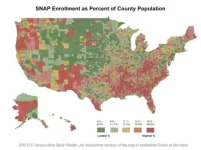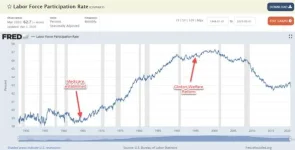:roll:
- You can be sick enough not to be able to work, but still not qualify for disability.
- You may need to take care of someone else -- a child, an elderly adult, a sick spouse etc.
- You may be in an area that simply does not have any work, and cannot afford to move.
- You may be trying to retrain for a new job. (Note:
Lots of part-time work is scheduled so chaotically, in favor of the employer of course, that it's often difficult to retrain and hold down a part-time job.)
- You may simply be between jobs (again, a frequent reason why unemployed people apply for SNAP).
- The local, national and/or global economy crashes, and takes your job with it. (That keeps happening, by the way.)
When it comes to safety nets, current situation is only extreme in the
rapidity in which it hit employment. Previous recessions are slower, but have much the same effect: Not enough jobs, too many job seekers.
And in your mind, starvation is the best way to achieve this? :roll:
Again, SNAP benefits are so low, that the idea it encourages long-term dependency is absurd. The program also gradually phases out, meaning recipients aren't punished when they earn a higher income.
Oh, and plenty of nations have halfway decent safety nets -- and
aren't overwhelmed with hordes of slackers, and have good growth and employment rates. Of course, one reason for that is the benefits often
help people who want to work, such as offering child care and health care. What a freakin' concept.
It also targets people who are temporarily unemployed due to no fault of their own -- whose ranks just grew by well over 10 million, and counting.
And yet again,
expanding or cutting safety nets has no effect whatsoever on the number of people who want to work. Your fundamental premise is obviously wrong, and buoyed not by evidence, but by ideology.
View attachment 67277396


